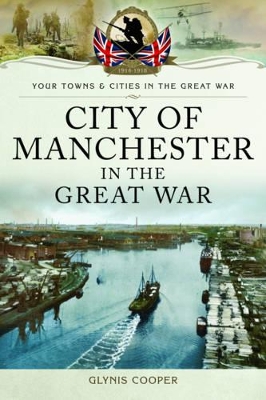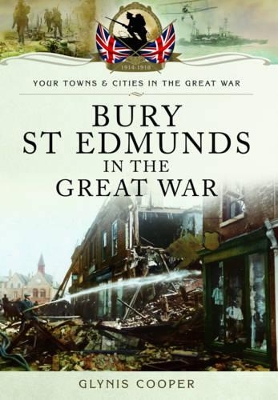Your Towns and Cities in the Great War
6 total works
The war touched almost every aspect of life on the Home Front, and those who were left behind suffered terribly. This book meticulously explores the problems, hardships and grief faced by Manchesters people and takes a detailed look the unfortunate areas that were hit the hardest. Throughout Britain, industry declined and wages suffered; prices of food and fuel rose sharply; essential foodstuffs and coal were hoarded for the black market; soldiers families doubled up with others, which caused severe overcrowding; housing and sanitation improvements ceased; there were epidemics of measles, chicken pox, influenza and TB; German U-boats tried to prevent supplies reaching Britain; and Zeppelin airships attempted to destroy British trade and industry. Manchester City suffered greatly because of its cotton trade, its industrial output, and its proximity to Liverpool, but its citizens were determined not to let the Kaiser win.
This book documents how they fought back by living in a twilight world of black outs so that enemy airships would miss their targets; how they accepted emergency rationing of food and coal, and restrictions; and how they worked tirelessly in the nearby cotton mills and munitions factories, and dug for victory on their allotments. Overall, the people of Manchester were united in their grief over the sad loss of life on the fronts. This grief broke across class barriers and saw debutantes and mill girls, alike, take comfort in each other. City of Manchester in the Great War tells the remarkable story of the spirit of a city whose citizens refused to give in, who strived to fight the odds that were stacked against them.
This book documents how they fought back by living in a twilight world of black outs so that enemy airships would miss their targets; how they accepted emergency rationing of food and coal, and restrictions; and how they worked tirelessly in the nearby cotton mills and munitions factories, and dug for victory on their allotments. Overall, the people of Manchester were united in their grief over the sad loss of life on the fronts. This grief broke across class barriers and saw debutantes and mill girls, alike, take comfort in each other. City of Manchester in the Great War tells the remarkable story of the spirit of a city whose citizens refused to give in, who strived to fight the odds that were stacked against them.
The Great War came as a shock to the citizens of Bury St Edmunds, a rural Suffolk town. One day they were celebrating a beautiful, hot August bank holiday at a large well-attended country fete; the next they were plunged into the deadliest war in history. Men from the Suffolk Regiment, who were based in the town's barracks, marched off to war and fought valiantly in Flanders, France and Gallipoli. Folk left at home devoted their time and energy to supporting the troops, the war effort and themselves, but they also found time to mark the 700th anniversary of the drawing up of Magna Carta in the local abbey and the tercentenary of Shakespeare's death. The reality of the war was brutally brought home by the heavy losses of the Suffolk Regiment, and by Zeppelin attacks on Bury in 1915 and 1916. The first attack caused a lot of damage, and the second attack was considerably more serious. Seven people were killed and there were a number of injuries. Just a few miles from Bury, a battlefield was re-created on the Elveden estate for training troops in the use and mechanics of tank warfare.Elveden had formerly been owned by the last Maharajah of the Punjab and his son, Prince Frederick Duleep Singh, fought for the British in both the Suffolk and Norfolk regiments.
Bury St Edmunds in the Great War tells the remarkable story of a town whose citizens refused to give in, who strived to fight the odds that were stacked against them. They worked hard to ensure the defeat of the kaiser and consequently, in recognition of their war efforts, Bury was awarded a captured German Kaffir tank in 1919.
Bury St Edmunds in the Great War tells the remarkable story of a town whose citizens refused to give in, who strived to fight the odds that were stacked against them. They worked hard to ensure the defeat of the kaiser and consequently, in recognition of their war efforts, Bury was awarded a captured German Kaffir tank in 1919.
A new book on Ashton-under-Lyne during World War I is being published as part of a series on Towns and Cities in the Great War to commemorate the centenary of the beginning of the War. It focuses on the economic and social conditions, problems and hardships of those left at home in England played out against a background of military action on the Western Front, in Turkey, Egypt and Palestine. Ashton was both a garrison town and a mill town. There were three Battalions based locally and over 1500 local men lost their lives. Sir Max Aitken, later Lord Beaverbrook, was Liberal Unionist MP for Ashton. In the summer of 1917 five tons of TNT exploded at an Ashton munitions factory destroying mills and houses, setting gasometers on fire and hurling acid drums into the river. Fifty people died and five hundred were injured. The book chronicles the difficulties, hardships, restrictions and morale of the town year by year as the War dragged on; the constant fear of Zeppelin raids; and the determined spirit of the folk of Ashton that the Kaiser would not beat them.
A new book on Glossop during World War I focuses on the economic and social conditions, problems and hardships of those left at home in England played out against a background of military action on the Western Front, in Turkey, Egypt and Palestine. It chronicles the difficulties, hardships and restrictions of daily life for civilians; the morale of the town year by year as the War dragged on; the growing lists of casualties and the stoical determination of the townsfolk to contribute as much as they could towards the defeat of the Kaiser. Part mill town, part farming community, Glossop's real strength turned out to be its rural parochialism. When the call came to 'dig for victory' the townsfolk did so with enthusiasm and the women proved themselves just as capable as the men. 1914 and 1915 saw some optimism but this changed after the Battle of the Somme in 1916, which destroyed the glorification of war. 1917 was a bad depressive year but despair finally mellowed in 1918. 1919 saw the impact of the influenza epidemic, the erection of War memorials, and, to Glossop's horror, the award of a tank in recognition of the town's War efforts.
Cambridge is one of the most famous universities in the world and its library is one of only five copyright libraries in the UK. At the start of the twentieth century it was a privileged life for some, but many in Cambridge knew that war was becoming truly inevitable. What the proverbial 'gown' feared communicated itself to the surrounding 'town'. Terrible rumours were rife, that the Germans would burn the university library and raise King's College chapel to the ground, before firing shells along the tranquil 'Backs' of the River Cam until the weeping willows were just blackened stumps. Frightened but determined, age-old 'town and gown' rivalries were put aside as the city united against the common enemy. This book tells Cambridge's fascinating story in the grim years of the Great War. Thousands of university students, graduates and lecturers alike enlisted, along with the patriotic townsfolk. The First Eastern General Military Hospital was subsequently established in Trinity College and treated more than 80,000 casualties from the Western Front.Though the university had been the longtime hub of life and employment in the town, many people suffered great losses and were parted from loved ones, decimating traditional breadwinners and livelihoods, from the rationing of food, drink and fuel, to hundreds of restrictions imposed by DORA.
As a result, feelings ran high and eventually led to riots beneath the raiding zeppelins and ever-present threat of death. The poet, Rupert Brooke, a graduate of King's College, died on his way to the Dardanelles in 1915, but his most famous poem The Soldier became a preemptive memorial and the epitaph of millions. If I should die Think only this of me That there's some corner of a foreign field That is forever England.
As a result, feelings ran high and eventually led to riots beneath the raiding zeppelins and ever-present threat of death. The poet, Rupert Brooke, a graduate of King's College, died on his way to the Dardanelles in 1915, but his most famous poem The Soldier became a preemptive memorial and the epitaph of millions. If I should die Think only this of me That there's some corner of a foreign field That is forever England.
Interest in the theft of cucumbers initially took precedence over news that war had been declared, but Stockport rallied quickly. Wakes week was cancelled, the local 6th Battalion of the Cheshires went to the Front and the town transformed half of its schools into much-needed military hospitals. Admirably, the remaining schools coped with double the number of children but education suffered little. At the time, Stockport was two towns; the millscapes around the Mersey and the Goyt and the wealthier genteel suburbs bordering the Cheshire countryside. Economy and efficiency in the use of food and fuel was preached in the local paper alongside advertisements for silks, satins, velvets, furs and evening gowns. The cotton and hatting trades, transport and agriculture, suffered badly from loss of resources and manpower but resisted the use of female labour with great hostility. Food, fuel and lighting restrictions caused problems and there were accusations of profiteering and hoarding. Always in competition with Manchester, Stockport folk did things their way. Following Zeppelin attacks on the east coast, street lights were ordered to be partially shaded.Manchester shaded its lights from the top, while Stockport shaded its lights from the bottom, causing confusion in the darkened streets below and prompting one wit to write that while Manchester was expecting attacks from Zeppelins, Stockport was clearly expecting attacks from submarines.
However, despite much political and material disaffection, the townsfolk united firmly against the kaiser. This book is is a timely reminder of how the local community worked together to provide munitions for the war, food parcels and comforts for the troops while 'keeping the home fires burning.'
However, despite much political and material disaffection, the townsfolk united firmly against the kaiser. This book is is a timely reminder of how the local community worked together to provide munitions for the war, food parcels and comforts for the troops while 'keeping the home fires burning.'


